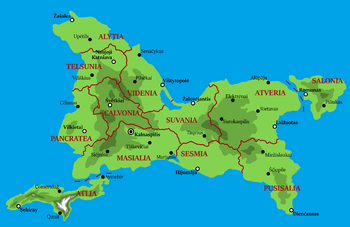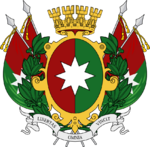Aucuria: Difference between revisions
mNo edit summary |
|||
| Line 1: | Line 1: | ||
{{Region icon Esquarium}} | |||
{{WIP}} | {{WIP}} | ||
{{Infobox country | {{Infobox country | ||
Revision as of 12:18, 1 May 2019
This article is incomplete because it is pending further input from participants, or it is a work-in-progress by one author. Please comment on this article's talk page to share your input, comments and questions. Note: To contribute to this article, you may need to seek help from the author(s) of this page. |
Aucurian Republic Aukurijos Respublika Avkür Respublika | |
|---|---|
| Motto: Libertas Omnia Vincit Liberty Conquers All | |
| Anthem: Aucurian name here TBD | |
 Political map of Aucuria | |
| Physical map of Aucuria Physical map of Aucuria | |
| Capital and largest city | Kalnaspilis |
| Official languages | Aucurian |
| Recognised regional languages | Atlian |
| Demonym(s) | Aucurian |
| Government | unitary presidential republic |
| Pantaleimonas Uspelevičius | |
• Speaker | Sulislova Petraitytė |
| Legislature | Saeimas |
| Establishment | |
• Unification | 1025 |
• Republic | 1790 |
| Area | |
• Total | 66,002 km2 (25,484 sq mi) |
• Water (%) | 1.77% |
| Population | |
• 2014 estimate | 11,360,284 |
• 2012 census | 11,335,067 |
| GDP (PPP) | 2012 estimate |
• Total | $365.96 billion |
• Per capita | $32,285.64 |
| GDP (nominal) | 2012 estimate |
• Total | $404.28 billion |
• Per capita | $35,666.30 |
| Gini (2014) | medium |
| HDI (2014) | very high |
| Currency | svāras (₺) (ASV) |
| Date format | dd/mm/yyyy (CE) |
| Driving side | right |
| Calling code | +372 |
| ISO 3166 code | AK |
| Internet TLD | .ak |
Aucuria (Aucurian: Aukurija; Atlian: Avküriye), officially the Aucurian Republic (Aucurian: Aukurijos Respublika; Atlian: Avkür Respublika), is a unitary presidential republic located in the Esquarian continent of Borea. An island country located in the Central Ocean off the coast of West Borea, Aucuria shares naval borders with Razaria and Nunalik to the northeast. It has a population of roughly 11.3 million people; its capital and largest city is Kalnaspilis.
Aucuria's history is unclear before its conquest in 416 CE by the Neo-Sepcan Empire. Located on the fringes of the empire and across the Cursenic Strait, Sepcan control over Aucuria was tenuous and periodically intermittent, with Aucuria serving as a shelter for rival courts on at least one occasion and becoming effectively, though not formally, independent by the 8th century. Nominal control of Aucuria by Sepcan pretenders was finally destroyed by the 917-922 Atlian invasion. The country was reunified in 1025 by Viltautas I, who subsequently proclaimed himself king. Territorial conflicts between the Kingdom of Aucuria and Atlian Khanate over the country's southwest dominated much of the Middle Ages; increased contact with Nordanoconitia in the 16th and 17th centuries ultimately gave Aucuria the upper hand in these conflicts, and Atlia was annexed in 1773. Increased contact with Nordanoconitia also led to the spread of Renaissance and Enlightenment ideals, manifested as syncary, in Aucuria during this period. Several years of intense famine led to the 1790-1792 Aucurian Revolution and the establishment of the Aucurian Republic. The country was run as a dictatorship for roughly eighty years following the Grey Putsch, but democracy was restored and equal rights extended to Atlians following the 1952 Velvet Revolution.
Located across the coast of western Borea, Aucuria has a maritime climate, with comparatively mild summers and winters. The country's terrain is largely flat, dotted with small lakes and swamps and covered with a mixture of grassland, farmland, and forest. Aucuria is particularly known for the fertility of its soil. Nowadays the country has a high-income mixed service economy, though industrial and agricultural production remain important economic sectors. Aucurian agriculture is dominated by the production of cereal crops, sugar beets, rapeseed, and dairy products; Aucurian industry, meanwhile, consists mostly of light industry, textile and furniture manufacturing, and food processing. Mining, timber, and tourism form smaller segments of the country's economy. The country scores highly on human development indices and has a moderate Gini coefficient.
Aucuria is a unitary presidential republic. Executive power at the national level is held by the President of Aucuria, currently Pantaleimonas Uspelevičius, elected by a two-round vote every five years. Legislative power is held by a unicameral legislature, the Saeimas, which consists of 246 members elected using a system of party-list proportional representation. The country's judiciary has two apex courts: the Supreme Court of Aucuria for judicial or criminal matters, and the Constitutional Court of Aucuria for constitutional matters. The country has twelve first-level administrative subdivisions: eleven provinces, and the autonomous province of Atlia. These provinces exercise relatively little autonomy under Aucuria's unitary system, except for Atlia, which exercises substantial devolved powers as per the 1952 Kelbecer Agreement. Aucuria is a member of the Esquarian Community and the International League. Regarded within Esquarium as an exemplar of liberal democracy, the Aucurian government is known for its fervent espousal of human rights internationally and the country is host to several prominent NGOs, including the Barauskas Foundation, Tamkevičius Organization, and Sergėtojai International.
Aucuria is home to two main ethnic groups, the ethnically-Baltic Aucurians and the ethnically-Turkic Atlians. Ethnic Aucurians make up roughly 80% of the country's population, with ethnic Atlians forming another 15%. The remaining 5% consists of various other ethnic groups, many of them asylees sheltered by the Aucurian government. While country has a substantial Tastanist minority, the majority of Aucurians practice the traditional religion of Miskism, while Atlians largely practice their own traditional religion, called Kelemism. Aucuria has a strong artistic tradition, particularly in the areas of music and dance, but the country is also known for its literature and visual art.
Etymology
Most linguists agree that the English "Aucuria" is ultimately derived from the Aucurian word aukuras, referring to the fire altars typically used in Miskist rituals, as are its Aucurian and Atlian equivalents. Aukuras, related to the term auka ("offering" or "sacrifice") is believed to come from the proto-Pan-Esquarian verb h₂ewg-, literally "to grow" or "to increase", but often used to mean "to honor" or "to exalt".
Aucuria was referred to by the Neo-Sepcans as Silari (Literary Vitrian: Selariska; Aucurian: Selarija), literally meaning "black duck". This term refers to an avian creature in Sepcan mythology known as the silari, frequently depicted as a giant black-feathered duck with the head of a woman and believed to deliver prophecies and divine revelations. Neo-Sepcan folklore held either that the silari resided in Aucuria, or that the body of the silari became Aucuria after being slain by a hero who disliked the prophecy it gave him, with its black feathers becoming the country's rich black soil.
Silari appears in Neo-Sepcan records dating back to the 2nd century CE, and appears to have been the primary name for the country during the existence of the Neo-Sepcan Empire; Aukurija, by contrast, is not attested before 779 CE. Silari appears to have rapidly fallen out of favor after the empire's collapse, however, and was wholly supplanted by Aukurija by the 11th century.
History
Prehistory and Antiquity
[prehistory]
[400s - neosepcans conquer aucuria, but precarious political position on the edge of the empire forces them to make compromises with local lords; they last for a bit]
[900s - atlians, under a warrior-sailor-king, come in and sack everything, driving the neosepcans out]
Medieval period
[1025 - aucurian warlord unifies enough to declare himself king; during this period most cultural alignment is with borea; rytokai-bajorai/leičiai-laukininkai-šeimynykščiai arrangement]
[atlian-aucurian wars throughout middle ages; atlia flourishing at this point]
[1500s-1600s, laukininkai become the miestininkai, aucurian trade ties with nordanoconitia grow just in time for the renaissance; aucuria flourishes culturally and gains the upper hand militarily]
Modern era
[1700s - aucuria conquers atlia; nordanoconitian connections mean that the enlightenment hits like a ton of bricks and the entire country larps latins while reimagining sualny]
[this plus famine means aucurian revolution; early republic does well for itself but shits on atlians; things go downhill 1850s-1870s and grey regime happens]
[factional divisions in the grey regime eventually end it; aucurian democracy restored; up to the present]
Geography
[flat; some topography in atlia, though; rivers, swamps, small lakes; something like 40% of the country is forest]
Climate
[maritime climate; insert climate chart here]
Wildlife
Politics
Governance
Aucuria is a unitary presidential republic, known in Esquarium for its strong liberal, democratic, and republican traditions. The Aucurian government is regulated by a system of checks and balances defined in the country's constitution and its amendments, and by the Declaration of the Rights of the People, the Aucurian bill of rights.
The President of Aucuria oversees the executive branch of the government, serves as the country's head of state and head of government, acts as commander-in-chief of the Aucurian Armed Forces, can veto bills before they become law (unless overruled by a two-thirds majority in the Saeimas) and issue executive orders, and nominates cabinet ministers, judges, and other national officers (who must be approved by the Saeimas). The president is elected directly in a two-round vote for a five-year term, and is limited to two terms in office. The current president is Pantaleimonas Uspelevičius, who was elected in 2017. Directly beneath the president is the Cabinet of Aucuria, which serves as an advisory body to the precedent and oversees Aucuria's fifteen government ministries and various independent agencies.
Aucuria's legislature is the Saeimas, a unicameral body with 246 seats. These seats are apportioned among Aucuria's provinces by population following each census. Members are elected by province every two years using a system of party-list proportional representation; a party must receive at least 5% of the vote to receive representation. The Saeimas holds the legislative initiative and must approve all national laws, approves treaties, declares war, and holds the power of the purse, and the ability to bring impeachment proceedings before the Supreme or Constitutional Court. Since 1952, the Saeimas has typically been dominated by the Labor Party, National Alliance, and Agrarian League, leading some political analysts to term Aucuria a "three-party system"; the breakdown of seats between these three parties has almost always required a coalition between at least two of the three major parties, as well as the support of smaller parties, in order to pass legislation. The current majority legislative coalition in the Saeimas consists of the Labor Party, Agrarian League, and Left Alliance.
Since 1952, Aucuria has had two apex courts: the Supreme Court of Aucuria and the Constitutional Court of Aucuria.
Administrative divisions
Largest cities
Foreign relations
Military and police
Economy
Agriculture
Forestry and mining
Industry
Commerce and finance
Science and technology
Media
Infrastructure
Transportation
Telecommunications
Energy
Tourism
Demographics
Ethnicity
[mostly aucurian; 10=15% atlian; some other minorities]
Religion
[miskism makes up the majority of aucurians, kelemism the majority of atlians; tastanist and cositene minorities along the eastern coast]


